You are using an outdated browser. Upgrade your browser today or install Google Chrome Frame to better experience this site.

Brazil Traveler View
Due to heavy rainfall, the state of Rio Grande do Sul is experiencing significant flooding . Travel by land may be dangerous in flood zones, and the healthcare infrastructure has been damaged in many areas. There is an increased risk of waterborne and vector-borne diseases in the flood-affected areas.
Avoid contact with floodwater , as it may contain harmful germs, other contaminants, or sharp objects; it may also conduct electricity from downed power lines. For your safety, follow all instructions from local authorities. Check the U.S. Embassy and Consulates in Brazil website for alerts. Consider enrolling in the Smart Traveler Enrollment Program (STEP) to receive security updates and information about emergency assistance.
Travel Health Notices
Vaccines and medicines, non-vaccine-preventable diseases, stay healthy and safe.
- Packing List
After Your Trip
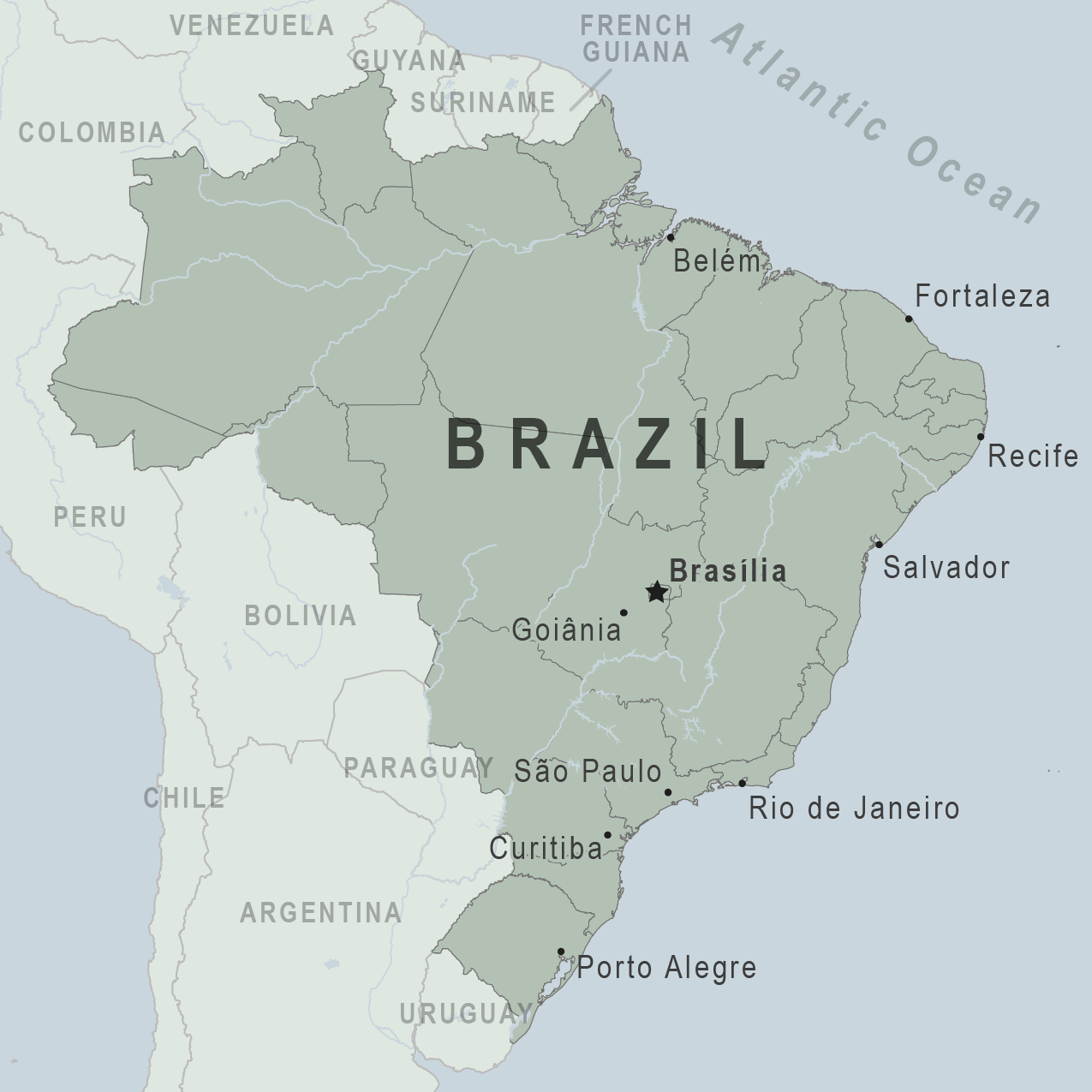
Be aware of current health issues in Brazil. Learn how to protect yourself.
Level 1 Practice Usual Precautions
- Updated Oropouche Fever in the Americas June 05, 2024 There are outbreaks of Oropouche fever in parts of Brazil, Bolivia, Peru, Colombia, and Cuba. Travelers to affected areas should take steps to avoid bug bites. Destination List: Bolivia, Brazil, Colombia, Cuba, Peru
- Dengue in the Americas May 16, 2024 Dengue is a risk in many parts of Central and South America, Mexico, and the Caribbean. Some countries are reporting increased numbers of cases of the disease. Travelers to the Americas can protect themselves by preventing mosquito bites. Destination List: Argentina, Brazil, Colombia, Costa Rica, Curaçao, Ecuador, including the Galápagos Islands, French Guiana (France), Guadeloupe, Guatemala, Guyana, Honduras, Martinique (France), Mexico, Nicaragua, Panama, Paraguay, Peru, Uruguay
⇧ Top
Check the vaccines and medicines list and visit your doctor at least a month before your trip to get vaccines or medicines you may need. If you or your doctor need help finding a location that provides certain vaccines or medicines, visit the Find a Clinic page.
Routine vaccines
Recommendations.
Make sure you are up-to-date on all routine vaccines before every trip. Some of these vaccines include
- Chickenpox (Varicella)
- Diphtheria-Tetanus-Pertussis
- Flu (influenza)
- Measles-Mumps-Rubella (MMR)
Immunization schedules
All eligible travelers should be up to date with their COVID-19 vaccines. Please see Your COVID-19 Vaccination for more information.
COVID-19 vaccine
Chikungunya
There has been evidence of chikungunya virus transmission in Brazil within the last 5 years. Chikungunya vaccination may be considered for the following travelers:
- People aged 65 years or older, especially those with underlying medical conditions, who may spend at least 2 weeks (cumulative time) in indoor or outdoor areas where mosquitoes are present in Brazil, OR
- People planning to stay in Brazil for a cumulative period of 6 months or more
Chikungunya - CDC Yellow Book
Hepatitis A
Recommended for unvaccinated travelers one year old or older going to Brazil.
Infants 6 to 11 months old should also be vaccinated against Hepatitis A. The dose does not count toward the routine 2-dose series.
Travelers allergic to a vaccine component or who are younger than 6 months should receive a single dose of immune globulin, which provides effective protection for up to 2 months depending on dosage given.
Unvaccinated travelers who are over 40 years old, immunocompromised, or have chronic medical conditions planning to depart to a risk area in less than 2 weeks should get the initial dose of vaccine and at the same appointment receive immune globulin.
Hepatitis A - CDC Yellow Book
Dosing info - Hep A
Hepatitis B
Recommended for unvaccinated travelers younger than 60 years old traveling to Brazil. Unvaccinated travelers 60 years and older may get vaccinated before traveling to Brazil.
Hepatitis B - CDC Yellow Book
Dosing info - Hep B
CDC recommends that travelers going to certain areas of Brazil take prescription medicine to prevent malaria. Depending on the medicine you take, you will need to start taking this medicine multiple days before your trip, as well as during and after your trip. Talk to your doctor about which malaria medication you should take.
Find country-specific information about malaria.
Malaria - CDC Yellow Book
Considerations when choosing a drug for malaria prophylaxis (CDC Yellow Book)
Malaria information for Brazil.
Cases of measles are on the rise worldwide. Travelers are at risk of measles if they have not been fully vaccinated at least two weeks prior to departure, or have not had measles in the past, and travel internationally to areas where measles is spreading.
All international travelers should be fully vaccinated against measles with the measles-mumps-rubella (MMR) vaccine, including an early dose for infants 6–11 months, according to CDC’s measles vaccination recommendations for international travel .
Measles (Rubeola) - CDC Yellow Book
Dogs infected with rabies are sometimes found in Brazil.
Rabies is also commonly found in some terrestrial wildlife species and bats.
If rabies exposures occur while in Brazil, rabies vaccines are typically available throughout most of the country.
Rabies pre-exposure vaccination considerations include whether travelers 1) will be performing occupational or recreational activities that increase risk for exposure to potentially rabid animals and 2) might have difficulty getting prompt access to safe post-exposure prophylaxis.
Please consult with a healthcare provider to determine whether you should receive pre-exposure vaccination before travel.
For more information, see country rabies status assessments .
Rabies - CDC Yellow Book
Recommended for most travelers, especially those staying with friends or relatives or visiting smaller cities or rural areas.
Typhoid - CDC Yellow Book
Dosing info - Typhoid
Yellow Fever
Recommended for travelers ≥9 months old going to the states of Acre, Amapá, Amazonas, Distrito Federal (including the capital city, Brasília), Espírito Santo,* Goiás, Maranhão, Mato Grosso, Mato Grosso do Sul, Minas Gerais, Pará, Paraná,* Piauí, Rio de Janeiro (including the city of Rio de Janeiro and all coastal islands),* Rio Grande do Sul,* Rondônia, Roraima, Santa Catarina,* São Paulo (including the city of São Paulo and all coastal islands),* Tocantins, and designated areas of Bahia*. Vaccination is also recommended for travelers going to Iguaçu Falls. Not recommended for travel limited to any areas not listed above, including the cities of Fortaleza and Recife *In 2017, in response to a large YF outbreak in multiple eastern states, CDC expanded its vaccination recommendations for travelers going to Brazil. The expanded YF vaccination recommendations for these states are preliminary. For updates, refer to the CDC Travelers’ Health website.
Yellow Fever - CDC Yellow Book
- Avoid contaminated water
Leptospirosis
How most people get sick (most common modes of transmission)
- Touching urine or other body fluids from an animal infected with leptospirosis
- Swimming or wading in urine-contaminated fresh water, or contact with urine-contaminated mud
- Drinking water or eating food contaminated with animal urine
- Avoid contaminated water and soil
- Avoid floodwater
Clinical Guidance
Schistosomiasis
- Wading, swimming, bathing, or washing in contaminated freshwater streams, rivers, ponds, lakes, or untreated pools.
Avoid bug bites
Chagas disease (american trypanosomiasis).
- Accidentally rub feces (poop) of the triatomine bug into the bug bite, other breaks in the skin, your eyes, or mouth
- From pregnant woman to her baby, contaminated blood products (transfusions), or contaminated food or drink.
- Avoid Bug Bites
Chagas disease
- Mosquito bite
Leishmaniasis
- Sand fly bite
- An infected pregnant woman can spread it to her unborn baby
Airborne & droplet
- Breathing in air or accidentally eating food contaminated with the urine, droppings, or saliva of infected rodents
- Bite from an infected rodent
- Less commonly, being around someone sick with hantavirus (only occurs with Andes virus)
- Avoid rodents and areas where they live
- Avoid sick people
Tuberculosis (TB)
- Breathe in TB bacteria that is in the air from an infected and contagious person coughing, speaking, or singing.
Learn actions you can take to stay healthy and safe on your trip. Vaccines cannot protect you from many diseases in Brazil, so your behaviors are important.
Eat and drink safely
Food and water standards around the world vary based on the destination. Standards may also differ within a country and risk may change depending on activity type (e.g., hiking versus business trip). You can learn more about safe food and drink choices when traveling by accessing the resources below.
- Choose Safe Food and Drinks When Traveling
- Water Treatment Options When Hiking, Camping or Traveling
- Global Water, Sanitation and Hygiene (WASH)
- Avoid Contaminated Water During Travel
You can also visit the Department of State Country Information Pages for additional information about food and water safety.
Prevent bug bites
Bugs (like mosquitoes, ticks, and fleas) can spread a number of diseases in Brazil. Many of these diseases cannot be prevented with a vaccine or medicine. You can reduce your risk by taking steps to prevent bug bites.
What can I do to prevent bug bites?
- Cover exposed skin by wearing long-sleeved shirts, long pants, and hats.
- Use an appropriate insect repellent (see below).
- Use permethrin-treated clothing and gear (such as boots, pants, socks, and tents). Do not use permethrin directly on skin.
- Stay and sleep in air-conditioned or screened rooms.
- Use a bed net if the area where you are sleeping is exposed to the outdoors.
What type of insect repellent should I use?
- FOR PROTECTION AGAINST TICKS AND MOSQUITOES: Use a repellent that contains 20% or more DEET for protection that lasts up to several hours.
- Picaridin (also known as KBR 3023, Bayrepel, and icaridin)
- Oil of lemon eucalyptus (OLE) or para-menthane-diol (PMD)
- 2-undecanone
- Always use insect repellent as directed.
What should I do if I am bitten by bugs?
- Avoid scratching bug bites, and apply hydrocortisone cream or calamine lotion to reduce the itching.
- Check your entire body for ticks after outdoor activity. Be sure to remove ticks properly.
What can I do to avoid bed bugs?
Although bed bugs do not carry disease, they are an annoyance. See our information page about avoiding bug bites for some easy tips to avoid them. For more information on bed bugs, see Bed Bugs .
For more detailed information on avoiding bug bites, see Avoid Bug Bites .
Some diseases in Brazil—such as dengue, Zika, leishmaniasis, and Chagas disease—are spread by bugs and cannot be prevented with a vaccine. Follow the insect avoidance measures described above to prevent these and other illnesses.
Stay safe outdoors
If your travel plans in Brazil include outdoor activities, take these steps to stay safe and healthy during your trip.
- Stay alert to changing weather conditions and adjust your plans if conditions become unsafe.
- Prepare for activities by wearing the right clothes and packing protective items, such as bug spray, sunscreen, and a basic first aid kit.
- Consider learning basic first aid and CPR before travel. Bring a travel health kit with items appropriate for your activities.
- If you are outside for many hours in heat, eat salty snacks and drink water to stay hydrated and replace salt lost through sweating.
- Protect yourself from UV radiation : use sunscreen with an SPF of at least 15, wear protective clothing, and seek shade during the hottest time of day (10 a.m.–4 p.m.).
- Be especially careful during summer months and at high elevation. Because sunlight reflects off snow, sand, and water, sun exposure may be increased during activities like skiing, swimming, and sailing.
- Very cold temperatures can be dangerous. Dress in layers and cover heads, hands, and feet properly if you are visiting a cold location.
Stay safe around water
- Swim only in designated swimming areas. Obey lifeguards and warning flags on beaches.
- Practice safe boating—follow all boating safety laws, do not drink alcohol if driving a boat, and always wear a life jacket.
- Do not dive into shallow water.
- Do not swim in freshwater in developing areas or where sanitation is poor.
- Avoid swallowing water when swimming. Untreated water can carry germs that make you sick.
- To prevent infections, wear shoes on beaches where there may be animal waste.
Schistosomiasis, a parasitic infection that can be spread in fresh water, is found in Brazil. Avoid swimming in fresh, unchlorinated water, such as lakes, ponds, or rivers.
Keep away from animals
Most animals avoid people, but they may attack if they feel threatened, are protecting their young or territory, or if they are injured or ill. Animal bites and scratches can lead to serious diseases such as rabies.
Follow these tips to protect yourself:
- Do not touch or feed any animals you do not know.
- Do not allow animals to lick open wounds, and do not get animal saliva in your eyes or mouth.
- Avoid rodents and their urine and feces.
- Traveling pets should be supervised closely and not allowed to come in contact with local animals.
- If you wake in a room with a bat, seek medical care immediately. Bat bites may be hard to see.
All animals can pose a threat, but be extra careful around dogs, bats, monkeys, sea animals such as jellyfish, and snakes. If you are bitten or scratched by an animal, immediately:
- Wash the wound with soap and clean water.
- Go to a doctor right away.
- Tell your doctor about your injury when you get back to the United States.
Consider buying medical evacuation insurance. Rabies is a deadly disease that must be treated quickly, and treatment may not be available in some countries.
Reduce your exposure to germs
Follow these tips to avoid getting sick or spreading illness to others while traveling:
- Wash your hands often, especially before eating.
- If soap and water aren’t available, clean hands with hand sanitizer (containing at least 60% alcohol).
- Don’t touch your eyes, nose, or mouth. If you need to touch your face, make sure your hands are clean.
- Cover your mouth and nose with a tissue or your sleeve (not your hands) when coughing or sneezing.
- Try to avoid contact with people who are sick.
- If you are sick, stay home or in your hotel room, unless you need medical care.
Avoid sharing body fluids
Diseases can be spread through body fluids, such as saliva, blood, vomit, and semen.
Protect yourself:
- Use latex condoms correctly.
- Do not inject drugs.
- Limit alcohol consumption. People take more risks when intoxicated.
- Do not share needles or any devices that can break the skin. That includes needles for tattoos, piercings, and acupuncture.
- If you receive medical or dental care, make sure the equipment is disinfected or sanitized.
Know how to get medical care while traveling
Plan for how you will get health care during your trip, should the need arise:
- Carry a list of local doctors and hospitals at your destination.
- Review your health insurance plan to determine what medical services it would cover during your trip. Consider purchasing travel health and medical evacuation insurance.
- Carry a card that identifies, in the local language, your blood type, chronic conditions or serious allergies, and the generic names of any medications you take.
- Some prescription drugs may be illegal in other countries. Call Brazil’s embassy to verify that all of your prescription(s) are legal to bring with you.
- Bring all the medicines (including over-the-counter medicines) you think you might need during your trip, including extra in case of travel delays. Ask your doctor to help you get prescriptions filled early if you need to.
Many foreign hospitals and clinics are accredited by the Joint Commission International. A list of accredited facilities is available at their website ( www.jointcommissioninternational.org ).
In some countries, medicine (prescription and over-the-counter) may be substandard or counterfeit. Bring the medicines you will need from the United States to avoid having to buy them at your destination.
Malaria is a risk in some parts of Brazil. If you are going to a risk area, fill your malaria prescription before you leave, and take enough with you for the entire length of your trip. Follow your doctor’s instructions for taking the pills; some need to be started before you leave.
Select safe transportation
Motor vehicle crashes are the #1 killer of healthy US citizens in foreign countries.
In many places cars, buses, large trucks, rickshaws, bikes, people on foot, and even animals share the same lanes of traffic, increasing the risk for crashes.
Be smart when you are traveling on foot.
- Use sidewalks and marked crosswalks.
- Pay attention to the traffic around you, especially in crowded areas.
- Remember, people on foot do not always have the right of way in other countries.
Riding/Driving
Choose a safe vehicle.
- Choose official taxis or public transportation, such as trains and buses.
- Ride only in cars that have seatbelts.
- Avoid overcrowded, overloaded, top-heavy buses and minivans.
- Avoid riding on motorcycles or motorbikes, especially motorbike taxis. (Many crashes are caused by inexperienced motorbike drivers.)
- Choose newer vehicles—they may have more safety features, such as airbags, and be more reliable.
- Choose larger vehicles, which may provide more protection in crashes.
Think about the driver.
- Do not drive after drinking alcohol or ride with someone who has been drinking.
- Consider hiring a licensed, trained driver familiar with the area.
- Arrange payment before departing.
Follow basic safety tips.
- Wear a seatbelt at all times.
- Sit in the back seat of cars and taxis.
- When on motorbikes or bicycles, always wear a helmet. (Bring a helmet from home, if needed.)
- Avoid driving at night; street lighting in certain parts of Brazil may be poor.
- Do not use a cell phone or text while driving (illegal in many countries).
- Travel during daylight hours only, especially in rural areas.
- If you choose to drive a vehicle in Brazil, learn the local traffic laws and have the proper paperwork.
- Get any driving permits and insurance you may need. Get an International Driving Permit (IDP). Carry the IDP and a US-issued driver's license at all times.
- Check with your auto insurance policy's international coverage, and get more coverage if needed. Make sure you have liability insurance.
- Avoid using local, unscheduled aircraft.
- If possible, fly on larger planes (more than 30 seats); larger airplanes are more likely to have regular safety inspections.
- Try to schedule flights during daylight hours and in good weather.
Medical Evacuation Insurance
If you are seriously injured, emergency care may not be available or may not meet US standards. Trauma care centers are uncommon outside urban areas. Having medical evacuation insurance can be helpful for these reasons.
Helpful Resources
Road Safety Overseas (Information from the US Department of State): Includes tips on driving in other countries, International Driving Permits, auto insurance, and other resources.
The Association for International Road Travel has country-specific Road Travel Reports available for most countries for a minimal fee.
For information traffic safety and road conditions in Brazil, see Travel and Transportation on US Department of State's country-specific information for Brazil .
Maintain personal security
Use the same common sense traveling overseas that you would at home, and always stay alert and aware of your surroundings.
Before you leave
- Research your destination(s), including local laws, customs, and culture.
- Monitor travel advisories and alerts and read travel tips from the US Department of State.
- Enroll in the Smart Traveler Enrollment Program (STEP) .
- Leave a copy of your itinerary, contact information, credit cards, and passport with someone at home.
- Pack as light as possible, and leave at home any item you could not replace.
While at your destination(s)
- Carry contact information for the nearest US embassy or consulate .
- Carry a photocopy of your passport and entry stamp; leave the actual passport securely in your hotel.
- Follow all local laws and social customs.
- Do not wear expensive clothing or jewelry.
- Always keep hotel doors locked, and store valuables in secure areas.
- If possible, choose hotel rooms between the 2nd and 6th floors.
To call for emergency services while in Brazil, dial 192 for an ambulance, 193 for the fire department, and 190 for the police. Write these numbers down to carry with you during your trip.
Learn as much as you can about Brazil before you travel there. A good place to start is the country-specific information on Brazil from the US Department of State.
Healthy Travel Packing List
Use the Healthy Travel Packing List for Brazil for a list of health-related items to consider packing for your trip. Talk to your doctor about which items are most important for you.
Why does CDC recommend packing these health-related items?
It’s best to be prepared to prevent and treat common illnesses and injuries. Some supplies and medicines may be difficult to find at your destination, may have different names, or may have different ingredients than what you normally use.
If you are not feeling well after your trip, you may need to see a doctor. If you need help finding a travel medicine specialist, see Find a Clinic . Be sure to tell your doctor about your travel, including where you went and what you did on your trip. Also tell your doctor if you were bitten or scratched by an animal while traveling.
If your doctor prescribed antimalarial medicine for your trip, keep taking the rest of your pills after you return home. If you stop taking your medicine too soon, you could still get sick.
Malaria is always a serious disease and may be a deadly illness. If you become ill with a fever either while traveling in a malaria-risk area or after you return home (for up to 1 year), you should seek immediate medical attention and should tell the doctor about your travel history.
For more information on what to do if you are sick after your trip, see Getting Sick after Travel .
Map Disclaimer - The boundaries and names shown and the designations used on maps do not imply the expression of any opinion whatsoever on the part of the Centers for Disease Control and Prevention concerning the legal status of any country, territory, city or area or of its authorities, or concerning the delimitation of its frontiers or boundaries. Approximate border lines for which there may not yet be full agreement are generally marked.
Other Destinations
If you need help finding travel information:
Message & data rates may apply. CDC Privacy Policy
File Formats Help:
- Adobe PDF file
- Microsoft PowerPoint file
- Microsoft Word file
- Microsoft Excel file
- Audio/Video file
- Apple Quicktime file
- RealPlayer file
- Zip Archive file
Exit Notification / Disclaimer Policy
- The Centers for Disease Control and Prevention (CDC) cannot attest to the accuracy of a non-federal website.
- Linking to a non-federal website does not constitute an endorsement by CDC or any of its employees of the sponsors or the information and products presented on the website.
- You will be subject to the destination website's privacy policy when you follow the link.
- CDC is not responsible for Section 508 compliance (accessibility) on other federal or private website.

- Work With Me
- SEO Services
- All Destinations
- Philippines
- Timor-Leste
- United Arab Emirates
- Czech Republic
- Netherlands
- Switzerland
- ALL Oceania
- New Zealand
- ALL North America
- United States of America
- ALL South America
- South Africa
- Adventure Travel
- Budget Travel
- Nature Travel
- Digital Nomad Life
- Australia – Sydney
- Colombia – San Andres
- Costa Rica – Tamarindo
- Czech Republic – Prague
- England – London
- Guatemala – Antigua
- Labuan Bajo
- Nusa Penida
- Japan – Tokyo
- Puerto Escondido
- New Zealand – Queenstown
- Netherlands – Amsterdam
- Spain – Barcelona
- Thailand – Bangkok
- UAE – Dubai
- Atlanta, Georgia
- Los Angeles, California
- Miami, Florida
- Orlando, Florida
- Vietnam – Ho Chi Minh
- Plan Your Trip
- Blogging Tips
- Boost Your Traffic For Free!
What You Need to Know To Travel To Brazil In 2024: A Complete Guide
Planning a trip to Brazil in 2024? Whether you’re enticed by the vibrant city life of Rio de Janeiro , the awe-inspiring Amazon rainforest, or the breathtaking beaches of Salvador, it’s crucial to have a comprehensive understanding of what awaits you in this diverse South American country.
Adequate preparation is key to ensuring a smooth and enjoyable travel experience. In this complete guide, I’ll provide you with all the essential information you need to know before embarking on your Brazilian adventure.

Throughout this guide, we’ll provide you with invaluable Brazil travel tips, insider insights, and recommendations to make your trip as enjoyable as possible. From navigating transportation options to exploring the country’s rich cultural heritage, we’ve got you covered.
So, get ready to immerse yourself in Brazil’s vibrant tapestry of sights, sounds, and flavours. By arming yourself with the knowledge and preparation outlined in this guide, you’ll be well-equipped to embark on an unforgettable adventure across one of South America’s most captivating destinations.
At A Glance
What To Expect When You Travel To Brazil
Best time to visit brazil, visa requirements, passport validity, travel insurance and essential documents, vaccinations, covid-19 protocols, travel restrictions and safety, 1. embark on a wild amazon rainforest expedition, 2. hike to christ the redeemer, 3. samba in rio de janeiro, 1. research your destination, 2. blend in, 3. stay informed, 4. use reliable transportation, 5. be aware of your surroundings, 6. watch out for fraud, 7. atm pink flags, 8. favelas – urban hood vibes, 9. big bashes like carnival, 10. dive safely, 6. share your itinerary, 7. stay connected and informed , holafly esim: your ticket to unlimited internet access.
Now, let’s delve into what you can expect when you travel to Brazil. First and foremost, it’s crucial to be aware of any travel restrictions that may be in place.
As of the current situation, please stay updated with the latest guidelines and regulations, as travel restrictions to Brazil may vary due to global circumstances. Always consult official sources such as your local embassy or consulate for the most accurate and up-to-date information.
Safety is a common concern for travellers, and Brazil is no exception. While the country offers incredible experiences, it’s important to exercise caution and remain vigilant, especially in crowded tourist areas and urban centres.
Familiarise yourself with the local customs and be mindful of your surroundings. By taking common-sense precautions, you can greatly reduce any potential risks and enjoy a safe and memorable journey.
When it comes to timing your visit, Brazil offers a variety of climates and experiences throughout the year. The best time to travel depends on your preferred activities and destinations within the country. From December to March, you’ll find Brazil in its summer season, with warmer temperatures and vibrant festivals like Carnival.
However, if you’re planning to explore the Amazon rainforest, it’s advisable to visit during the drier months from June to November to make the most of your wildlife encounters and trekking adventures.

Rio de Janeiro, Brazil
Travel Requirements for Visiting Brazil
For U.S. citizens planning to travel to Brazil in 2023, it’s important to understand the visa requirements. As of the latest updates, Brazil requires U.S. passport holders to obtain an entry visa before their arrival .
However, it’s worth noting that there have been discussions of visa exemption for U.S. citizens in the future, so it’s advisable to stay updated with the latest information from the Brazilian embassy or consulate.
To enter Brazil, your passport must be valid for at least 6 months beyond your planned departure date. It’s essential to check your passport’s expiration date well in advance and renew it if necessary. This precaution ensures smooth entry and avoids any potential travel disruption.
While not mandatory, it’s highly recommended to have travel insurance when visiting Brazil. Travel insurance provides financial protection in case of unforeseen events such as medical emergencies, trip cancellations, or lost baggage. For long-term travellers like myself, I always fall back on either Safetywing or PassportCard Nomads .
Be sure to review the policy coverage carefully to ensure it meets your specific needs and covers any activities you plan to engage in during your trip.
In addition to a valid passport and travel insurance, it’s essential to carry certain documents with you during your visit to Brazil. These include your flight tickets, hotel reservations, a copy of your travel itinerary, and contact information for your embassy or consulate in case of any emergencies or unforeseen circumstances.
Although there are no mandatory vaccinations for entry into Brazil, it’s recommended to be up-to-date on routine vaccines .
Additionally, it’s advisable to consult with a healthcare professional or travel medicine specialist regarding any recommended vaccinations based on your specific travel plans and personal health circumstances.
Due to the ongoing pandemic, Brazil has implemented specific COVID-19 protocols for travellers. These may include pre-travel testing, quarantine measures, or presenting a digital health declaration form.
It’s essential to stay informed about the latest requirements by checking the official websites of the Brazilian government, your airline, and the local health authorities in your departure country.
As a digital nomad, I know how important to travel safely during this pandemic , so make sure you do your best to prioritize your health!
While Brazil is a captivating destination, it’s important to stay informed about any travel restrictions that may be in place. Travel advisories and restrictions can vary depending on the global situation and may be subject to change.
Stay updated with information from reliable sources such as your local embassy, the Brazilian embassy, and official travel websites.
What To Do In Brazil
When it comes to jaw-dropping destinations and thrilling experiences, Brazil reigns supreme. Brace yourself for a whirlwind of adventure as we unveil the top 3 must-do activities that’ll make your trip to Brazil an unforgettable journey of a lifetime!
Prepare to be mesmerised by the enchanting allure of the Amazon rainforest . Immerse yourself in the heart of the world’s largest tropical rainforest, where vibrant wildlife and lush vegetation create a symphony of nature’s wonders.
Explore the mighty Amazon River on a captivating boat tour , witness exotic creatures in their natural habitat, and discover hidden gems tucked away in this ecological paradise.
Brace yourself for thrilling encounters with pink river dolphins, playful monkeys, and colourful birds, all while basking in the mystical ambience that only the Amazon can offer.
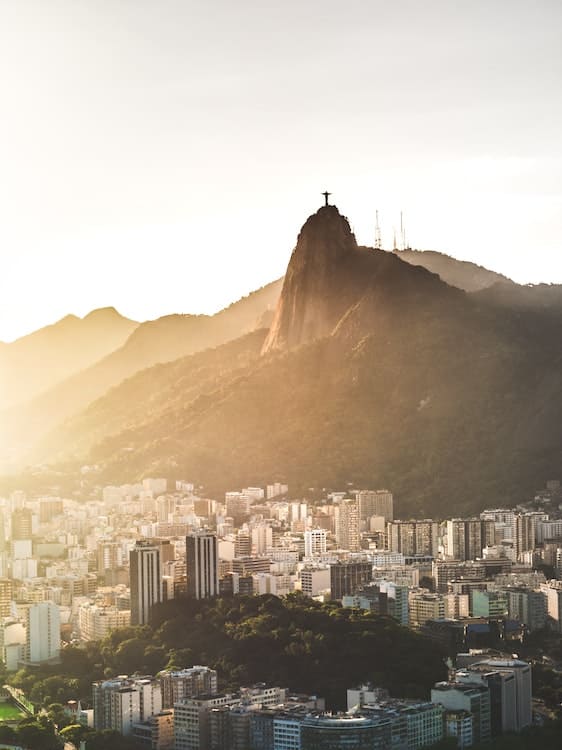
Elevate your travel experience with an epic hike to one of the New Seven Wonders of the World – Christ the Redeemer .
Brace yourself for an exhilarating journey to the pinnacle of Corcovado Mountain , where the colossal statue of Christ stands, arms outstretched, offering a breathtaking panoramic view of Rio de Janeiro.
As you ascend, feel the rush of adrenaline and the awe-inspiring beauty of the surrounding Tijuca Forest National Park .
Reach the summit, stand in awe before the iconic figure, and let the sheer magnitude of the moment take your breath away. Capture the perfect Instagram-worthy snapshot and create memories that’ll forever be etched in your heart.
No trip to Brazil is complete without experiencing the pulsating energy and vibrant nightlife of Rio de Janeiro . Brace yourself for a kaleidoscope of colours, pulsating rhythms, and the infectious joy of samba.
Join the revellers at the legendary Carnival, where streets come alive with extravagant costumes, captivating floats, and electrifying music. Dance the night away in the bustling samba clubs, where the infectious beats will sweep you off your feet.
Feel the rhythm in your soul as you sway to the music and become part of the vibrant tapestry that’s the essence of Rio’s party scene.
With these extraordinary adventures awaiting you, Brazil beckons you to unleash your wanderlust and dive into a world of unforgettable experiences. So, pack your bags, embrace the spirit of exploration, and get ready to create memories that’ll last a lifetime in the captivating land of Brazil!

Pelourinho, Salvador, Brazil
Safety Tips for Travellers in Brazil
When travelling to Brazil, it’s essential to prioritise your safety to ensure a pleasant and worry-free trip.
While Brazil offers a wealth of incredible experiences, it’s important to be aware of certain safety considerations and take necessary precautions. By following these safety tips, you can mitigate potential risks and enjoy a memorable visit to this vibrant country.
Here are some general safety considerations.
Before travelling to Brazil, familiarise yourself with the specific safety situation of the regions you plan to visit. Stay updated on travel advisories and avoid areas with a high crime rate or political unrest.
It’s advisable to consult official sources such as your country’s embassy or consulate for the most accurate information.
Dress modestly and avoid wearing expensive jewellery or flashing valuable items. By blending in with the local culture and not drawing unnecessary attention to yourself, you can reduce the risk of becoming a target for theft or scams.
Stay up-to-date with the latest news and developments in the areas you’re visiting. Follow local news sources or reputable international news outlets to stay informed about any potential risks or safety concerns.
For personal security, there are measures for you to take into consideration for a smooth and amazing experience.
Opt for registered taxis or rideshare services rather than unmarked or unofficial vehicles. Avoid hailing taxis on the street, especially at night, and instead, ask your hotel or restaurant to arrange transportation for you.
Stay vigilant in crowded places, tourist attractions, and public transportation. Keep an eye on your belongings, particularly in crowded areas where pickpocketing may occur. Avoid displaying expensive electronic devices or large amounts of cash in public.
Be on guard against bank and credit card trickery, which is pretty common here. That includes sneaky stuff like card cloning at ATMs or shops. Keep a close eye on your card, and if something feels off at an ATM, don’t use it. Oh, and do your bank a solid by giving them a heads-up about your trip beforehand, so they don’t freeze your card unexpectedly.
If you hit up an ATM and spot any pink marks, don’t hesitate – chat up the bank (or the police) ASAP to swap that cash. Those pink stains could mean the cash is messed up or fake, and nobody wants that.
Favelas are like these informal, unplanned neighbourhoods – you’ll find them in big Brazilian cities. They can be tiny pockets or sprawling areas. Sometimes they’re near tourist hotspots. Just be in the know about where you’re heading.
Hitting up a massive party like Carnival? Keep your radar on. Crooks might target folks who seem loaded or a little out of it. Look after yourself, stay sharp, and be careful if some random person tries to pull you away from the crowd.
If you’re taking a dip, be water smart. Some beaches have gnarly currents that can be tricky. Listen up to local advice, watch those warning flags, and spot where the lifeguards are hanging.
Sharks are a real thing, especially around Recife in the northeast. Pay attention to those warning signs and chat up lifeguards if you’re not sure. Stay out of the water if you see those signs – sharks don’t mess around, even in waist-deep water.
Inform a trusted person, such as a family member or friend, about your travel plans and itinerary. Check in with them regularly and provide updates on your whereabouts.
Having a reliable internet connection during your trip to Brazil is crucial for staying connected and informed. With an internet data plan, you can enjoy the convenience of unlimited internet access, ensuring you have vital information and communication at your fingertips.
Remember, the key to a safe journey in Brazil is being prepared, informed, and alert. By following these safety tips and staying connected with a reliable internet connection, you can make the most of your travel experience while ensuring your personal well-being throughout your adventure in Brazil.
In the age of connectivity, staying connected while travelling has become a necessity. Enter Holafly eSIM, your passport to seamless and unlimited internet access during your adventure in Brazil.
Say goodbye to the hassle of purchasing local SIM cards or relying on public Wi-Fi hotspots. I can attest to that first hand having to travel around different parts of Europe in the same trip. With Holafly eSIM, you can stay connected wherever you go, ensuring you have the world at your fingertips.
So, how does eSIM technology work, and why is it advantageous? Unlike traditional physical SIM cards, eSIM is embedded directly into your device, eliminating the need for a physical swap.
This means no more searching for SIM card vendors or dealing with compatibility issues. With a few simple taps, you can activate Holafly eSIM on your device, allowing you to enjoy high-speed internet without any limitations.
Holafly eSIM offers a myriad of benefits that’ll enhance your travel experience. Firstly, it provides you with reliable and high-speed internet coverage throughout Brazil, even in remote areas.
From the bustling streets of Rio de Janeiro to the breathtaking landscapes of the Amazon rainforest, you can stay connected and share your adventures in real time.
Not only does Holafly eSIM provide extensive coverage, it also offers cost-effectiveness. With competitive pricing plans tailored to suit various travel durations and data needs, you can select the package that best aligns with your requirements.
No more worrying about excessive roaming charges or limited data allowances. Holafly eSIM ensures you have the freedom to explore, connect, and share without breaking the bank.
Getting started with Holafly eSIM is a breeze. Simply visit the Holafly website , select your desired plan, and follow the easy steps to purchase and activate your eSIM.
Whether you’re an experienced traveller or embarking on your first international trip, Holafly eSIM makes staying connected effortless and convenient.
As we conclude this complete guide to travelling to Brazil in 2023, let’s recap the key points that’ll ensure your journey is nothing short of extraordinary. Adequate preparation is paramount, from meeting travel requirements to prioritising your safety.
Brazil is a country brimming with diverse landscapes, vibrant culture, and thrilling experiences. Whether you’re exploring the Amazon rainforest, conquering heights to reach Christ the Redeemer, or immersing yourself in the electric atmosphere of Rio de Janeiro, Brazil promises unforgettable memories at every turn.
The wonders of this magnificent country await you—so pack your bags, chase your dreams, and embark on a journey that’ll leave an indelible mark on your soul. Brazil is calling. Will you answer?
Isabel Leong
Full-time travel blogger at Bel Around The World and SEO coach roaming the world at a whim, Isabel helps aspiring content creators and brands get the most out of their online presence by attracting organic leads/traffic and achieving financial freedom with her Skyrocket With SEO course. She's closely involved in and has been featured as a speaker in other travel & digital nomad networks & podcasts such as Traverse, Travel Massive, The Nomadic Network and Location Indie.

Hi! I'm Isabel, a full-time traveller and digital nomad from Singapore. In the past 10 years, I've lived in New Zealand , Japan , Kauai Hawaii , Mexico , Costa Rica and Bali . Pulling from my own world travel adventures and blogging lessons, I share my tried and tested tips, so that I can get YOU to work LESS and play MORE!

Previous Post How Much Data Do You Need to Travel in Europe? A Comprehensive Guide
Next post costa rica vs mexico - choosing the perfect tropical escape.
Comments are closed.
- Destinations
- Privacy Policy
- Skyrocket Your Site Traffic!
Join the newsletter and get exclusive travel tips, giveaways and more!
There are times to stay put, and what you want will come to you. And there are times to go out into the world and find such a thing for yourself. – Lemony Snicket
© 2024 Bel Around The World. All Rights Reserved. Website design by Hello Pomelo .
We’re sorry, this site is currently experiencing technical difficulties. Please try again in a few moments. Exception: request blocked
Our local experts can design your trip based on your preferences
Warning - You are using an outdated browser. Please upgrade your browser to properly view this website.

- Destinations
- South america
- Plan your trip
Planning a trip to Brazil
Plan your trip to Brazil with Insight's online travel advice on visas, embassies, transport, healthcare, currency and what to read.
• Visa and entry requirements
• Embassies and consulates
• Transport
• Health and safety
• Money and budgeting
• What to read
Note: if you are travelling to Brazil for the FIFA World Cup 2014, you will also find regularly updated travel information on the British Foreign and Commonwealth Office site .
Visa and entry requirements
Tourist visas used to be issued routinely to all visitors upon arrival, but Brazil now has a reciprocity policy: if Brazilians need a visa in advance to visit your country, you will need a visa in advance to visit Brazil. US citizens need to apply for a visa in advance; European Union citizens do not. Your airline or travel agent should be able to tell you if you need a visa; or contact a Brazilian consulate or embassy. Do not take it for granted that you do not need a visa.
If you do not need a visa in advance, your passport will be stamped with a tourist visa upon entry. This permits you to remain in the country for 90 consecutive days. If you apply for a visa in advance, you have up to 90 days after the issue date to enter Brazil. Upon entry, you will get a tourist visa allowing you to stay in Brazil for up to 90 days.
If you are traveling to several countries and not going straight to Brazil, the entry visa needn’t be issued in your home country, but it’s still a good idea to allow for enough time in order to avoid surprises and hassles. The 90-day tourist visa can be renewed once only for another 90 days. To get an extension, go to the immigration section of the federal police.
Temporary visas for foreigners who will be working or doing business in Brazil allow a longer stay than a regular tourist visa. If you are a student, journalist or researcher, or employed by a multinational company, contact the Brazilian consulate or embassy in your country well before you plan to travel. It is usually difficult – or even impossible – to change the status of your visa once you are in the country. If you come with a tourist visa, you will probably have to leave the country to return on another type of visa.
Permanent work visas and residency visas normally require the applicant to have a job offer in a senior position from a Brazilian company, or in a small group of professions that is determined by the government. Application must be made from outside Brazil and the process is lengthy and bureaucratic.
Embassies and consulates
19 Forster Crescent, Yarralumla, Canberra, act 2600
Tel: 6126-273 2372
http://camberra.itamaraty.gov.br
Canada
450 Wilbrod Street, Ontario, K1N 6M8
Tel: 1-613-237 1090
http://ottawa.itamaraty.gov.br
Harcourt Centre, Europa House, Block 9, Harcourt Street, Dublin 2
Tel: 353-1-475 6000
http://dublin.itamaraty.gov.br
New Zealand
10 Brandon Street – Level 9, PO?Box 5432, Wellington
Tel: 644-473 3516
http://wellington.itamaraty.gov.br
South Africa
Hillcrest Office Park, Pretoria
Tel: 12-366 5200
http://pretoria.itamaraty.gov.br
32 Green Street, London W1K 7AT
Tel: 020-7399 9000
http://londres.itamaraty.gov.br
Washington DC: 3006 Massachusetts Avenue, NW, DC 20008
Tel: 202-238 2805
http://washington.itamaraty.gov.br
Los Angeles: 8484 Wilshire Blvd, Suites 730–711, Beverly Hills, CA 90211
Tel: 213-651 2664
http://losangeles.itamaraty.gov.br
New York: 1185 Avenue of the Americas, 21st Floor, New York, NY 10036
Tel: 917-777 7777
http://novayork.itamaraty.gov.br
Getting to Brazil

By air
Many airlines offer international services to and from Brazil with a variety of routes. Most direct in-coming flights head for São Paulo and then stop at Rio de Janeiro, although there are an increasing number of non-stop flights to Rio. Brasília, Belo Horizonte, Salvador, Fortaleza, Natal and Recife also receive a limited number of international flights. Direct international flights link Brazil with both the east and west coasts of the United States, as well as with Florida and Canada, major cities in Europe, South America, Japan, the Gulf, and several African cities.
Brazil’s main international carrier is TAM Airlines, which in 2011 merged with Chile’s LAN to create LATAM, the largest airline in the southern hemisphere. Both airlines still fly under their respective brands and are members of the oneWorld alliance.
Flight time from the US is nine hours from New York, slightly less from Miami, and 12 hours from Los Angeles. Flights from Europe take 11–12 hours. Almost all international flights are overnight, so you arrive in the early morning.
International Airlines
A number of Brazilian airlines currently operate both domestic and international flights: They include TAM, Gol, Azul and Avianca Brasil. For Brazilian Airlines, see under Getting Around.
Most of the major international airlines have headquarters in São Paulo. Main contact numbers/websites are as follows:
Aerolíneas Argentinas 2441 Alameda Santos, 14th Floor Tel: 11-6445 3806 www.aerolineas.com.ar
Aeroméxico 777 Avenida Paulista, 13th Floor, Centro Tel: 11-3253 3888 www.aeromexico.com
Air Canada 949 Avenida Paulista, 13th Floor Tel: 11-3254 6600 www.aircanada.com.br
Air France 222 Avenida Chedid Jafet, Block B, 2nd Floor Tel: 11-3049 0900/6445 2211 www.airfrance.com.br
Alitalia 777 Avenida Paulista, 2nd Floor Tel: 11-2171 7610/3191 8706 www.alitalia.com
American Airlines 216 Rua Araújo, 9th–10th Floors Tel: 11-4502 4000/6445 3568/6445 3508 www.aa.com.br
ANA 368 Rua da Conolação Tel: 11-2141 2121 www.ana.co.jp
Avianca 7059 Avenida Washington Luis Tel: 11-2176 1111/2240 4413 www.avianca.com.br
British Airways 745 Alameda Santos, 7th Floor Tel: 0300-7896140/11-4004 4440 www.britishairways.com
Continental Airlines 247 Rua da Consolação, 13th Floor Tel: 0800-7027500/11-2445 4208 www.continental.com
Copa 1337 Avenida Paulista Tel: 11-3549 2672 www.copaair.com
Cubana 222 Rua da Consolação, 7th Floor Tel: 11-3214 4571 www.cubana.cu
Delta Airlines 61 Rua Marquês de Itu, 12th Floor Tel: 11-4003 2121/6445 3926 www.delta.com
Emirates 92 Rua James Joule, 7th Floor Tel: 11-5503 5000 www.emirates.com
Ibéria 216 Rua Araújo, 3rd Floor Tel: 11-3218 7130/3218 7140 www.iberia.com
JAL 542 Avenida Paulista, 3rd Floor, Paraíso Tel: 11-3175 2270/6445 2340 www.jal.com
KLM 222 Avenida Chedid Jafat, Block B Tel: 11-3049 0000/0800-880 1818 www.klm.com
Lan Chile 247 Rua da Consolação, 12th Floor Tel: 11-2121 9020 www.latam.com
Lufthansa 1356 Rua Gomes de Carvalho, 2nd Floor, Itaim Bibi Tel: 11-3048 5800 www.lufthansa.com
Pluna 368 Rua da Consolação, 4th Floor Tel: 11-3231-2822 www.pluna.com.uy
South African Airlines 852 Alameda Itú, 1st Floor Tel: 11-6445 4151 www.flysaa.com
Swiss 745 Alameda Santos, 6th Floor Tel: 11-3016 4747 www.swiss.com
TAP 134 Praça José Gaspar Tel: 11-2131 1200/0800-707 7787 www.flytap.com
United Airlines 777 Avenida Paulista, 8th Floor Tel: 11-3145 4200/0800-162 323 www.united.com.br
There is no longer any regular ocean passenger service to Brazil, but it is possible to get there by boat. Costa ( www.costacruise.com ) is a major operator that runs many cruises up and down the Atlantic coast of South America during the European winter, and it – and a number of other cruise lines – will take on transatlantic passengers when the ships relocate between Europe or the Caribbean and Brazil. Other companies include Avalon Waterways, Celebrity, MSC, Oceania, P&O, Princess, Regent Seven Seas, Royal Caribbean, Saga, Seabourne, and Silversea. Several round-the-world cruise ships call at Brazilian ports, and reservations can be made for the trip to Brazil only. Special cruises travel up the Amazon river or visit Rio at Carnival time.
With the port development in Rio de Janeiro, it is expected that cruise ships will play an important role in the accommodations for the 2016 Olympic games.
Long-distance bus services run between a few of the larger Brazilian cities and major cities in neighboring South American countries, including Asunción (Paraguay), Buenos Aires (Argentina), Montevideo (Uruguay), and Santiago (Chile). The highway from Manaus to Caracas has been paved, allowing a regular daily bus service. While undoubtedly a good way to take in the landscape, remember that the distances are great, and you may find yourself on a bus for several days and nights at a time. However, buses are usually of a high standard, in many cases providing toilets, food, and even almost-fully reclining seats.
Getting around Brazil
Because Brazil is such an enormous country, it has a good network of domestic flights. The airline industry in Brazil has gone through significant reorganization in recent years. Main domestic operators are TAM, Azul, and Gol/Varig, with Trip, Brava, Pantanal, Passaredo, and Avianca offering budget or regional services. All of the larger lines fly extensive routes throughout the country and have ticket counters at the airports and ticket offices in most cities. At smaller airports in the more remote cities, these may only be staffed shortly before a flight.
Tickets can also be purchased at travel agencies and often at hotels, and reservations can be made by phone or on the airlines’ websites. Information is usually provided in English as well as Portuguese. Airlines used to offer a toll-free service, but most now charge a premium rate.
Deregulation means that on some routes, flying is cheaper than traveling by bus. Discounts of up to 60 percent can be obtained for some internal flights. Travel agents in Brazil can give you details. The large airlines also operate shuttle services between Rio and São Paulo (with flights every half-hour), Rio and Brasília (flights every hour), and Rio and Belo Horizonte (usually about 10 flights per day). On domestic flights, checked baggage is limited to 20kg (44lb), and internationally accepted norms apply for hand luggage.
Brazilian Airlines
Avianca Brasil Tel: 4004 4040 www.avianca.com.br
Azul Tel: 4003 1118 www.voeazul.com.br
Tel: 0800-609 5800
Tel: 0300-115 2121 www.voegol.com.br
Pantanal Linhas Aéreas Tel: 0800-702 5888 www.voepantanal.com.br
Tel: 0300-1001 777
www.voepassaredo.com.br
Rico Tel: 92-3652 1696 www.voerico.com.br
TAM Tel: 4002 5700 www.latam.com
Trip Tel: 0300-789 8747 www.voetrip.com.br
Except for crowded urban commuter railways, trains are not a major form of transportation in Brazil, and rail links are minimal. There are a few train trips, however, which are tourist attractions in themselves, either because they are so scenic or because they feature antique steam-powered trains. Their schedules can be rather erratic, however, so check carefully before going to catch one of these trains.
In the southern state of Paraná, the 110km (66-mile) Curitiba–Paranaguá railroad ( www.serraverdeexpress.com.br ) is famous for spectacular mountain scenery. The first part of the trip, to Morretes, is the most beautiful.
A return trip can be done in a day. Bear in mind that you may not see much on a cloudy day.
The same company also runs the Pantanal Express ( www.pantanalexpress.com ) that operates on a route between Campo Grande and Miranda.
In the state of Minas Gerais, antique steam locomotives haul passengers the 12km (7 miles) between São João del Rei and Tiradentes on a narrow-gauge railway from Friday to Sunday, and holidays.
Comfortable, on-schedule long-distance bus services are available between all major cities, and even to several other South American countries. Remember that distances are great and bus rides can be long – in other words, several days. But you could break up a long journey with a stop along the way.
On most routes there are three classes available. You can take a regular bus, with upholstered, reclining seats; an executive bus, with more comfortable seats; or the top-rate sleeper ( leito ) bus, which has wider and fully reclining seats with foot rests, as well as coffee and soft drinks on board.
On some routes, there may be just one bus a day (such as the Rio–Belém route, a 52-hour trip) or just one or two a week. Try to buy your ticket in advance through a travel agent or at the bus station.
There is a local bus service to the smaller, more isolated towns. This is quite a different experience and will leave you with no doubts that you are in a still-developing country. Almost always overcrowded, buses bump along dirt roads, picking up passengers who wait along the roadside, often with large bundles they are taking to market. Those who travel standing up – often for three to four hours or more – are charged the same as those who paid for a numbered seat. For the visitor, it may be a new experience, but you certainly have to admire the endurance and patience of the people for whom this precarious system is the only form of getting around.
Motoring in Brazil may seem chaotic compared with the rest of the world. Rio drivers are especially notorious for their erratic lane-changing, in-town speeding and disregard for pedestrians and other drivers on the road. Be on the defensive and expect the unexpected. Although it doesn’t seem to deter local drivers, speeding fines can be huge (several hundred dollars) even for going slightly over the limit, which can change erratically. There are speed cameras on many roads.
The highways, especially the interstates, are generally quite good, but are crowded with more trucks than you will have ever seen. These huge vehicles bog down traffic on winding, climbing stretches of road in the mountains. Be aware that there are different rules of the road. It is polite to beep your horn when overtaking, and flashing your lights is a warning, for example.
If you plan to drive a lot in Brazil, buy the excellent Quatro Rodas (Four Wheels) Guia Brasil road guide, complete with road maps, city and regional itineraries, and hotel and restaurant listings (in Portuguese), which is available at most news-stands. The same company produces a more detailed Guia Estradas, with larger-scale road maps of the whole country, plus a range of individual state maps.
It is against the law to drink and drive in Brazil. There is zero tolerance. If in any doubt take a taxi and don’t risk it.
Vehicle Hire
Car rental facilities are available in the larger cities. Both Avis and Hertz operate in Brazil; www.avis.com.br , tel: 11-2155 2847 with a large number of outlets across Brazil; or hertz , tel: 11-2246 4300, São Paulo office open Mon–Fri 6am–11.45pm. Another option is Yes; www.yesrentacar.com.br ; tel: 0800-709 2535.
The largest Brazilian national chains are: Localiza ( www.localizahertz.com ; 24-hour reservations, tel: 31-3247 762/0800-979 2000); and Unidas ( www.unidas.com.br ). Note that these websites are in Portuguese only. There are also good regional companies, especially in the northeast resorts for renting beach buggies.
Rates vary depending on the type of car. Some companies bill a flat daily rate, while others bill by mileage. Major international credit cards are accepted by these companies. Some will charge extra if you rent a car in one city and hand it back in another. Check exactly what you are getting on your insurance – it’s worth paying more to be covered for all eventualities.
Arrangements can be made at the airport as you arrive, through your hotel or at the agencies. An international driving license is helpful, but you can also rent a car with your own country’s driving license. For a relatively modest additional fee, you can hire a driver with the car.
Health and safety
Medical care.
A yellow-fever certificate may be required if you are arriving from certain South American and African countries. This is subject to change, so check with the Brazilian Consulate. If you plan to travel in areas outside of cities in the Amazon region or in the Pantanal in Mato Grosso, however, it is recommended that you have a yellow-fever shot. This protects you for 10 years, but is effective only after 10 days, so plan ahead. Be sure to get a certificate for any vaccination. It is also a good idea to protect yourself against malaria in these same jungle areas: there are drugs that will provide immunity, and most need to be taken for several days before visiting the area. Consult your doctor or local public-health service.
Prescription drugs are available in abundance – frequently without a prescription – and you may even find old favorites that have been banned for years in your country. Bring a supply of any prescription drugs that you take regularly, but simple things like aspirin, antacids, plasters, sunscreen, and suchlike, are easy to obtain. However, there have been cases of falsification of medicines, so it’s best to buy drugs in larger chain stores or in the big cities. Drug stores also sell cosmetics; sanitary protection can be purchased in any drug store or supermarket.
Some US health insurance plans cover any medical service you may require while abroad, but you should check with the company, and if not, ensure you have private medical insurance before traveling, which is something visitors from the UK and elsewhere should always do.
Medical Emergencies
Should you need a doctor while in Brazil, your hotel should be able to recommend reliable professionals who often speak several languages. Many of the better hotels have a doctor on duty. Your consulate will also be able to supply you with a list of physicians who speak your language.
Phone 192 – Ambulance
Sadly, personal crime, in the form of pickpocketing and theft from hotel rooms, is common in parts of Brazil, particularly in bigger cities. But with a little caution and common sense, most visitors manage to avoid trouble.
When traveling, always carry valuables and money in a money-belt, worn out of sight underneath clothing, and don’t wear a flashy watch or expensive jewelry. Be especially alert in crowded places, such as rush-hour subway stations, city buses, beaches, and markets. Seek advice from your hotel about local areas to avoid at night. A good general rule is to avoid the beach after dark.
Take photocopies of your passport and important documents and, if traveling with a friend, keep copies of each other’s documents.
Phone 190 – Police
Tourist police
Tourist police (delegacia de proteção ao turista) can be contacted in the following cities:
São Paulo tel: 11-3257 4475 Aeroporto de São Paulo, Congonhas tel: 11-5090 9032. Aeroporto Internacional de São Paulo, Guarulhos tel: 11-2611 2686 Rio de Janeiro tel: 21-2332 2924 Salvador tel: 71-3116 6817
Fortaleza tel: 85-3101 2488
Women's police
The women’s police stations specialize in crimes against women, and are staffed by female officers:
São Paulo tel: 11-3976 2908 Rio de Janeiro tel: 180
Money and budgeting
The currency is the real (plural, reais ), which is made up of 100 centavos .
The use of commas and decimal points in Portuguese is the opposite of what you may be used to. In Portuguese, one thousand reais is written R$ 1.000,00.
Cash and cards
ATM machines can be found throughout Brazil, including in airports, and major shopping areas usually accept Visa and MasterCard/Cirrus cards. The two major that provide ATM service are HSBC and Banco do Brasil. There will usually only be one international machine at a branch, and it may not be clear which one, so keep trying.
Banks will not exchange reais or traveler’s checks into foreign currency. The only exception to this is the Banco do Brasil, which has branches at international airports.
Most hotels will accept payment in traveler’s checks or by most major credit cards. Many restaurants and shops take credit cards; the most frequently accepted are American Express, Diners Club, MasterCard and Visa, which all have offices in Brazil. You can also pay with dollars. Hotels, restaurants, stores, taxis, and so on, will usually quote an exchange rate.
Hotels and the more expensive restaurants will automatically add a 10 percent service charge to your bill, but this doesn’t necessarily go to the individuals who served you and were helpful to you. Don’t be afraid of overtipping – most employees earn a pittance and rely on the generosity of tourists.
Tipping taxi drivers is optional; most Brazilians don’t. Again, if your driver has been especially helpful or waited for you, reward him appropriately. At the airport, tip the last porter to help you – what you pay goes into a pool.
A 10–20 percent tip is typically expected in barber shops and beauty salons. Gas-station attendants, the people who shine your shoes, etc. should be tipped a small amount, again, depending on the level of service.
If you are a house guest, leave a tip for any household help (who cooked or laundered for you while you were there). Ask your hosts how much would be appropriate to give them. A tip in dollars will be especially appreciated. A small gift brought from home will certainly be welcome, and may even be better.
Domestic flights carry an embarkation tax of roughly US$4–9, depending on the size of the airport. On international flights out of Brazil you pay roughly US$36. In addition, some companies may have fuel and security surcharges. Check with your travel agent when buying your ticket to find out if all these are included.
Budgeting for your trip
Allow US$120 upwards a day for two people for accommodations, starting at the hostel or “cheap and cheerful” level; US$25 per person a day upwards for basic meals in snack bars and inexpensive restaurants, without alcohol; obviously meals in better restaurants cost a lot more. Allow around US$15 a day for getting around Rio or São Paulo, based on one taxi ride and the rest by bus or Metro.
What to read
To get a feel for Brazilian culture, the following novels all provide insights:
Brazil , by John Updike . Boy from the Rio slums meets upper-class girl in this tale set in a dream-Brazil.
City of God , by Paulo Lins . The novel on which the award-winning film was based: life and violence in a Rio slum.
Dona Flor and Her Two Husbands , by Jorge Amado . Widow Dona Flor remarries, only to find her lusty first husband popping up from the dead to claim his conjugal rights.
The Brothers , by Milton Hatoum . Set in Manaus during the rubber boom.
City of the Beasts , by Isabel Allende . A coming-of-age tale set in the Amazon jungle.
Read more from the travel guide to Brazil
- Top attractions
- Historical highlights
- Cultural features
- Top restaurants
- Useful phrases

- Tours >
- Destinations >
- South America Tours >
- Brazil Tours
Filter by Style
Filter by price.
Or select specific range
Filter by Duration
Or select range of days
Filter by Savings
- Cancel anytime
- Get a full refund
Travel anywhere when it’s right for you. The new flexible way to travel given today’s reality. Access independent adventures, group tours, and private trips from 20+ top tour operators. Redeem or cancel for a refund by 2023.
Filter by COVID Safety
Filter by flexibility, filter by traveler's age, filter by accommodation, filter by physical level, filter by theme, filter by cities & attractions, filter by activities, filter by trip pace, filter by price per day (per person), filter by flights & transport, filter by solo friendly, filter by brands, filter by countries, filter by continents & regions, filter by rivers & seas, filter by travelstride gives back, filter by dates.

JavaScript seems to be disabled in your browser. You must have JavaScript enabled in your browser to utilize the functionality of this website.
- Top Brazil Tours
- Brazil Attraction Guide
- Suggested Brazil Itineraries
- Brazil Landmarks
Top Brazil Travel Companies
Brazil in 10 days.

Argentina Uruguay and Brazil Discovery (Classic)
Flights & transport:, itinerary focus:.
- Buenos Aires: Start your first full day in Buenos Aires with a city tour of Argentina's cosmopolitan capital. Take in the gorgeous local sights, including the Palacio Barolo, Casa Rosada and Plaza de Mayo.
- Colonia Del Sacramento: Visit the city of Colonia del Sacramento, with its charming cobbled streets and historic buildings. Now a UNESCO World heritage site, this colorful destination was originally founded by the Portuguese in the 1600s.
- Iguassu Falls: Take in breathtaking views of the jungle and falls, before heading out with a Local Expert to explore the Argentinian side of the park.
- Iguassu Falls: Today you’ll take a guided visit to the Brazilian side of Iguassu Falls. While the walk is on the shorter side, it's no less impressive, allowing you to see all the cascades at once.
- Rio de Janeiro: Conclude the day with a cable car ride up to Sugarloaf Mountain for panoramic views of the Guanabara Bay and Rio's mountainous coastline.
- Rio de Janeiro: In the morning, take a tour of Tijuca Forest National Park, where you’ll find Mount Corcovado, home to the iconic Christ the Redeemer statue.
- Buenos Aires: Witness a private demonstration and performance by professional tango dancers and musicians at an authentic “conventillo” in La Boca, where you will be introduced to this passionate dance and upbeat music.
- Montevideo: Sip and savor the wines of Juanicó winery, a 1000-acre vineyard that has been harvesting grapes since 1835. On your tour, learn about the privileged soil and micro-climate of the Juanicó Region that has turned this area into a renowned viticulture site.
- Rio de Janeiro: Join a local botanist for an exclusive guided visit to Rio’s Botanical Garden, a research and preservation site for a rare collection of bromeliads and orchids, as well as old trees and exotic plants.
- Buenos Aires: Relax and unwind before meeting your Travel Director and fellow guests for a Welcome Dinner and drinks.
- Buenos Aires: Enjoy an authentic Asado Porteno (Argentinian barbecue) with local chef, Luis. He will share his own family recipe and how grilling the perfect beef has become a family ritual and local tradition.
- Montevideo: Visit a local olive oil farm in the countryside of Colonia Del Sacramento and enjoy a tour of their facilities with a local expert before sitting down for a farm to table lunch paired with local wines.
- Iguassu Falls: Your Highlight Dinner will be served at The Argentine Experience where you'll learn how to prepare your own wine-based cocktail, and your own empanadas. Afterword, savor an Argentinian picada and sample mate and Alfajores, Argentina's famous national sweet. To enhance your dining experience, your dishes will be complemented by Argentinian wine pairings.
- Rio de Janeiro: Enjoy a lunch with a classic Caipirinha cocktail at Casa Camolese, a contemporary restaurant situated next to the botanical garden.
- Rio de Janeiro: In the evening, commemorate your holiday as you join your new friends for a memorable Celebration Dinner at a traditional Brazilian churrascaria with beautiful views of the Sugarloaf Mountain.
- Optional - Buenos Aires: Experience Buenos Aires from the water on a 30-minute boat tour from Puerto Madero viewing some of the city’s most important districts. Characterized by its location at the River de la Plata, separating the Uruguayan and Argentinean coastline, Buenos Aires enjoys a unique setting.
- Optional - Buenos Aires: The San Telmo Market is a melting pot of culinary and cultural experiences showcasing the Porteño culture at its best. On your visit, embrace the colors and scents of fresh fruit, spices, coffee, pizza and other snacks as well as antiques typical for this traditional district of Buenos Aires. In addition to the array of foods, view the Italian façade representing one of the most important waves of immigrants back in 1897.
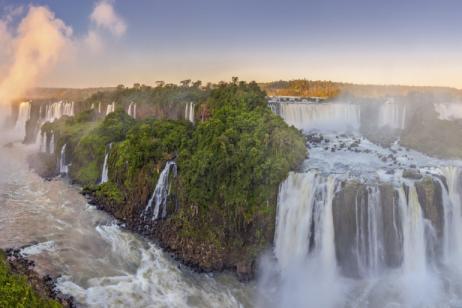
Argentina & Brazil Exploration Tour
- Start your journey in Buenos Aires the capital of Argentina, where culture, art, and gastronomy are ever-present.
- Meet Iguazú Falls, one of the Seven Natural Wonders of the World, and take a boat trip!
- Visit Rio de Janeiro in Brazil and feel the welcoming spirit of the city where people dance samba all year round, and visit the colossal Christ the Redeemer.
- Best time to travel: All year round.
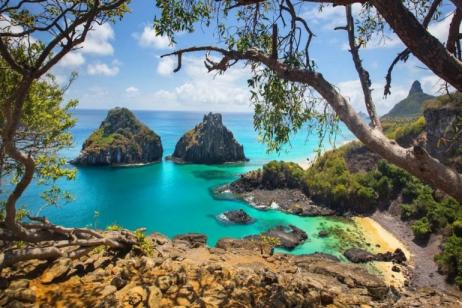
Recife - Porto de Galinhas - Fernando de Noronha 2022
- Porto de Galinhas
- Fernando de Noronha 2022
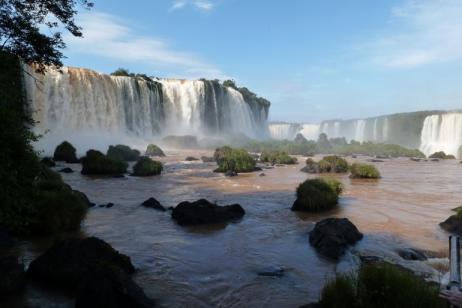
Discovering the East in 9 days - Iguassu Falls & Ibera Wetlands
- Observe the incredible landscapes and the vast typical fauna and flora of the region
- Discover the Iberá Wetlands, an important place in Argentina for its animal diversity
- Complete nature trip

Land of the Jaguar
- Seven boat trips to maximise chances of jaguar sightings
- 90 percent success in jaguar sightings to date
- Explore a more off-the-beaten-path part of the Pantanal
- Wetland birdwatching
- Good chances of seeing capybaras, giant anteaters, jabiru storks and other wildlife
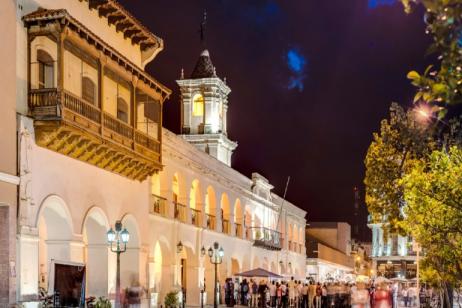
Landscapes of the North & Falls
- Experience an authentic tango show in a traditional tango house in the former immigrant neighborhood of Buenos Aires.
- Explore Jujuy’s giant salt flats and their surreal deserts.
- Take a boat tour to the lush waterfalls in Iguazú Falls.
- Best time to travel: All year round
Want a tailor-made trip instead?
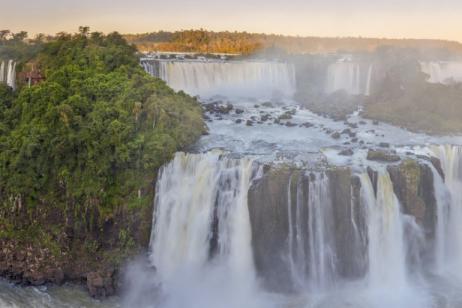
Buenos Aires, Iguazu Falls & Rio – 9 Days
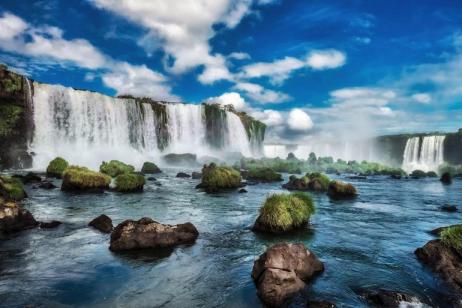
Impressions of South America

South America Samba
Member savings.

Classic South America (Small Groups)

Argentina Uruguay and Brazil Discovery (Small Groups)
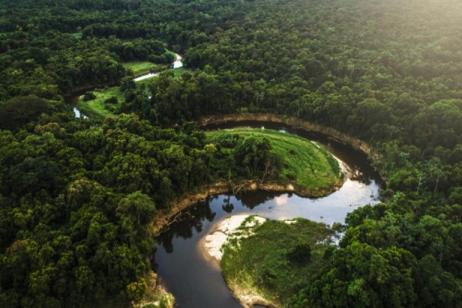
Exotic Brazil 12 days/11 nights
- Experience the most exotic places of Brazil in 12 days.
- Visit Rio de Janeiro, Foz de Iguassu Falls, and Paraty.
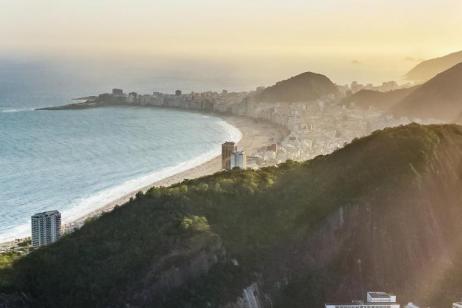
Argentina & Brazil Adventure
- Discover Buenos Aires, Argentina's sultry and sensual capital. Tour its best sights, then explore its many corners at your leisure, from the star-studded Recoleta cemetery to the tucked-away milongas (tango halls)
- Explore the lush landscapes of the Ibera Wetlands in search of anacondas, otters, howler monkeys and a vast array of colourful birds
- With included visits to Iguazu Falls from both the Argentinian and Brazilian sides, you'll get the most out of this jaw-dropping natural wonder
- Finish in Rio de Janeiro, where you're free to stroll the sands of Copacabana, soar across town on the Sugarloaf Cable Car or delve into the city's pulsing nightlife

Sun, Tango and Wine 2023
- Rio de Janeiro
- Foz do Iguacu
- Buenos Aires
- Santiago de Chile

Exotic Carnival in Brazil 2024
- Be a part of the greatest event of the world: The Carnival!
- Admire Rio de Janeiro‘s green hills, blue sky, turquoise ocean, beautiful bays, and marvelous beaches!
- Enjoy the breathtaking, spectacular and not to be missed Iguazu Falls!
- Get a closer look at the unique nature of the Amazon!
- Leisure time on the amazing beaches in Buzios!
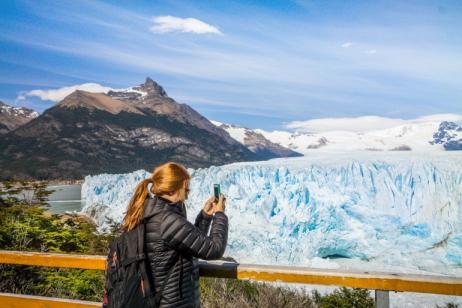
Ice to Sun 2023: Argentina & Brazil
- The highlights of South America's most European and cosmopolitan city, Buenos Aires!
- Perito Moreno Glacier - a magnificent giant ice glacier!
- The marvelous Devil's Throat, the strongest of all the waterfalls of Iguazu!
- 275 waterfalls, each has its own name, are thrown with a roar in the gorge "Devil's Throat".
- Rio de Janeiro with its green hills, blue ocean water, sandy beaches, and joyful people!

Best of Argentina, Uruguay & Brazil
- Soak up the cosmopolitan charms of Buenos Aires and explore the sights of its historic city centre on foot.
- Spend three days at a working estancia (farm) in Uruguay, where you can spend your time getting involved in farm work, riding horses or simply relaxing in the sun.
- Enjoy incredible home-cooking and hospitality during your estancia stay, and learn about Uruguay’s gauchos – legendary cowboys.
- Stop in colourful Colonia del Sacramento, where vintage cars line the streets and an old drawbridge leads to the UNESCO-listed Old Quarter.
- The mighty Iguazu Falls straddles the border between Argentina and Brazil, and you’ll cross the border to see it from both countries.
- Save up to 32% off trips to every continent on earth
- Redeem anytime before 2023. Last minute changes OK.
- Get a full refund.
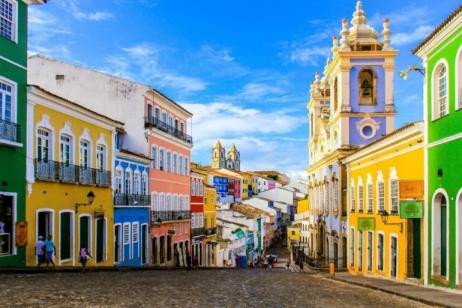
Romantic Brazil
- City Tour and Sugar Loaf
- Corcovado and Christ the Redeemer Statue
- Iguazu falls
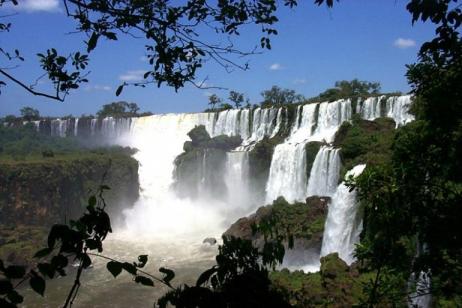
Gems of Argentina in 9 days
- Explore Buenos Aires, cosmopolitan city of South America
- Discover Iguazu Falls and Iguassu National Park
- Classic tour to discover Argentina

Argentina & Brazil in 10 days - Latin Capitals & Iguazu Falls - Charm
- Iguazu Falls, Argentinian side
Christ the Redeemer
- Iguazu Falls, Brazilian side
Related Trips & Tours
Brazil reviews & ratings, why travelstride, additional details, what you should know before going on a brazil tour, best time to visit brazil.
The timing of your trip will largely depend on what you plan to do. It’s important to pay attention to the amount of rain, the temperature, and when the festivals are to ensure your expectations are met:
Touring the Amazon and Pantanal in Brazil
If you are planning an Amazon adventure , know that the rainy season runs from December to May. That’s all relative though, as heavy rains can occur all year round. To give yourself the best chance of not being stuck in a torrential downpour, plan your Amazon trip after the rainy season in May. June is the best time to see wildlife, as the river is at its highest but the driest season hasn’t arrived yet.
The same goes for the Pantanal. The rainy season is between February and April. It is best to avoid the time between February and March, when the rains are relentless. The Pantanal sees its hottest temperatures in the summer, December to February, and hotels and hostels often close due to the heat and the mosquitos. The dry season in the winter, May to September, is your best bet for wildlife sightings and comfortable weather.
Bahia and Northern Brazil
If you plan to visit one of the many charming cities in northern Brazil, you will be rewarded with tropical temperatures and humidity. The northern area of Brazil experiences temperatures that linger in the 80’s all year long. The ocean temperatures also stay at a comfortable swimming temperature year-round. The north does experience a rainy season from
Rio de Janeiro and São Paulo
These two cities have pleasant weather all year round. December to February are Brazil’s summer months, when temperatures are in the high 80’s and rain falls often. Even with the precipitation, rain storms tend to come and go quickly, so sunny days are plentiful. February is also the month of Carnival, and Rio is the top destination to celebrate.
Carnival season is incredibly expensive in Rio. Hotels rates can triple and vacancy can be limited. It is recommended that you book lodging a year in advance if you want to be a part of the biggest party in the world.
Spring and autumn in these cities are far more temperate and without the haze of the precipitous summer. Winter temps are still pleasant during the day but drop in the evening, so travelers may be surprised when they need a jacket.
How long should you plan for a tour in Brazil?
If you stick to one region of Brazil, it is totally possible to have an amazing tour in one week. You can take an Amazon River tour , or visit the city of Rio and venture from there to Iguazu Falls in just seven days. These tours do have a quick pace, so if you’re looking for a more in depth look at Brazil, plan for at least a ten day tour. If you want to include different regions in your tour, such as the Amazon and Rio , plan for a tour that is 10-14 days long to avoid feeling rushed
Always Find the Best
Find and compare Brazil Tours from as short as 4 days to as long as 24 days. Travelstride searches over 1,000 websites and companies so you don't have to and found 366 Brazil Tours offered by 115 travel companies. 63 people reviewed these Brazil Tours.
In order to see Travelstride Select deals you must sign in. We’ve negotiated with many of the world’s best travel companies to save you money! Get the best experiences, save up to $700 per person, and be a hero to your travel companions!
We respect your privacy and take great care to protect your information. By joining you agree to our Privacy Policy and Terms of Use .
With FREE membership you:
- Save up to $700 per person!*
- Access private deals and offers
- See personalized trip recommendations
- Save favorite trips
Top Brazil Attractions
Sugarloaf Mountain
Amazon Rainforest
São Paulo
Top Activties in Brazil
Hiking to see the Christ the Redeemer Statue
Copacabana Beach
Exploring the many sides of Rio
Seeing amazing wildlife in the Amazon
Spending the night at a lodge in Iguazu Falls
Click to send a new magic link to your inbox.
Welcome back!
By signing in, you agree to our Privacy Policy and Terms of Use
- Bookmark trips you like
- Share with your travel companions
- Track price changes
- Access private discounts on trips you save
TripFinder is a member-only feature. Dont worry, its free!
With a membership you:
Just use the email address and password provided in the email we sent.
With your free membership you:

Your travel guide dog
Searching thousands of trips by hundreds of tour companies...
Fetching your trip.
Just a moment, Rover is fetching your perfect trip.

IMAGES
VIDEO
COMMENTS
If your travel plans in Brazil include outdoor activities, take these steps to stay safe and healthy during your trip. Stay alert to changing weather conditions and adjust your plans if conditions become unsafe. Prepare for activities by wearing the right clothes and packing protective items, such as bug spray, sunscreen, and a basic first aid kit.
Travel Requirements for Visiting Brazil. For U.S. citizens planning to travel to Brazil in 2023, it’s important to understand the visa requirements. As of the latest updates, Brazil requires U.S. passport holders to obtain an entry visa before their arrival.
While Brazil’s COVID-19 vaccination requirements may change, the CDC recommends that U.S. citizens eligible for vaccination should not travel internationally until they are fully vaccinated. The U.S. Department of State Travel Advisory for Brazil is currently Level 4: Do Not Travel due to COVID-19.
Plan your trip to Brazil with Insight's online travel advice on visas, embassies, transport, healthcare, currency and what to read. • Visa and entry requirements • Embassies and consulates
Experience the best of Brazil in 10 days. Itineraries and trips from 98 experts. Compare tours, packages, and independent trips for a 10 day Brazil vacation.
Best time to go. Brazil is continental, and climate and seasons vary across the country. Rio and the southeast are hot November-April, warm May-October and wettest December-March. Bahia and the...